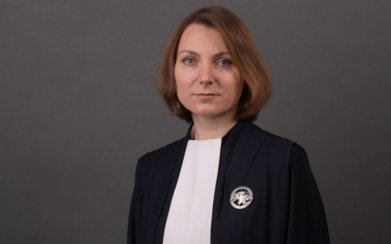Contact center of the Ukrainian Judiciary 044 207-35-46
ABOUT THE SUPREME COURT
FOR CITIZENS
ACTIVITY
PRESS-CENTER

Supreme Court Judge Hanna Kolomiiets explained that "simplified" adoption violates the rights of the child and does not meet the highest (best) interests of the child.
There are widespread reports on the Internet calling for the urgent adoption of children whose parents allegedly died during Russia's large-scale military invasion of Ukraine.
I would like to draw the citizens' attention to the fact that there is no such thing as "accelerated" adoption, as such a procedure violates children's rights in the first place.
Adoption cannot be «accelerated» or under «simplified» procedure, especially (!) in the context of martial law.
Pursuant to art. 207 of the Family Code of Ukraine, the adoption shall be the acceptance by the adopter in his/her family of a person as his/her daughter or son, such acceptance being effected based on the judicial decision.
An adoption of a child is effected in the best interests of the child to ensure him/her a stable and harmonious home.
In accordance with parts 1 and 3 of Art. 218 of the Family Code of Ukraine, for a child to be adopted there should be his/her consent, if he/she has reached such an age and level of development that can express it. The child’s consent is not required for the adoption if he/she, because of the age or state of health, does not have sufficient understanding of the adoption.
Chapter 18 of the Family Code of Ukraine regulates all issues concerning those who are subject to adoption, who can adopt a child, who have the priority right to adopt (primarily relatives of the child), who cannot be an adoptive parent, on the registration of children who may be adopted, and registration of persons wishing to adopt a child.
Procedural matters relating to the consideration of adoption cases by the courts are regulated by Chapter 5 of the Civil Procedure Code of Ukraine.
This category of cases is considered by a jury.
The application for adoption of a child is submitted to the court at the place of residence.
The court considers the case on adoption of a child with the obligatory participation of the applicant, the guardianship authority or the authorised executive authority, as well as the child, if he/she is aware of the adoption by age and state of health, with the summons of interested parties and other persons the court deems necessary to interrogate (Art. 313 of the Civil Procedure Code of Ukraine).
What are the highest (best) interests of the child in adoption which guide the courts in such cases?
Firstly, it is the right of the child to be raised by the parents or, in their absence, by other relatives of the child.
In the context of war, when it is very difficult to ascertain the real situation with the child's parents (whether they are dead or alive, missing, possibly wounded, whether their whereabouts are known, whether there are other relatives of the child who want to take care of the child), there is a risk of violating the child's right to maintain ties with the family.
Secondly, it is in the best interests of the child to ensure that he/she develops in a safe, secure and stable environment, not a disadvantaged one.
This screening criterion applies in particular to those who have expressed a desire to adopt a child, starting with whether they can be adoptive parents, whether they are registered as those who wish to adopt a child and whether they are really capable in all senses of becoming parents to the child, to give love, respect and understanding to him/her, to provide financially, to take care of the harmonious development of his/her personality.
It is clear that the criterion of a safe and healthy environment is very important, the life and health of the child depends on it, and therefore it can not be determined superficially, but requires careful scrutiny, which in turn eliminates "urgency" and "simplified" procedure.
Thirdly, it is necessary to establish the consent of the child to adoption if he/she has reached such an age and level of development that can express it (parts 1 and 3 of Article 218 of the Family Code of Ukraine).
In addition, under martial law, the adoption of children can take place only in those regions where no hostilities are taking place, where children's services and courts operate, and only in relation to those children whose parents' or other relatives' life circumstances have been established.
All of the above applies to the adoption of children by both citizens of Ukraine and foreigners.
Children deprived of parental care can be helped not through adoption, but through temporary adoption of children until their parents or other relatives are found, placement of the child in the family of relatives, acquaintances, a foster carer’s family, placement of the child in custody, care, in a foster family or in a family-type orphanage.
However, in any case, the placement of the child in the family is done through the children's service.